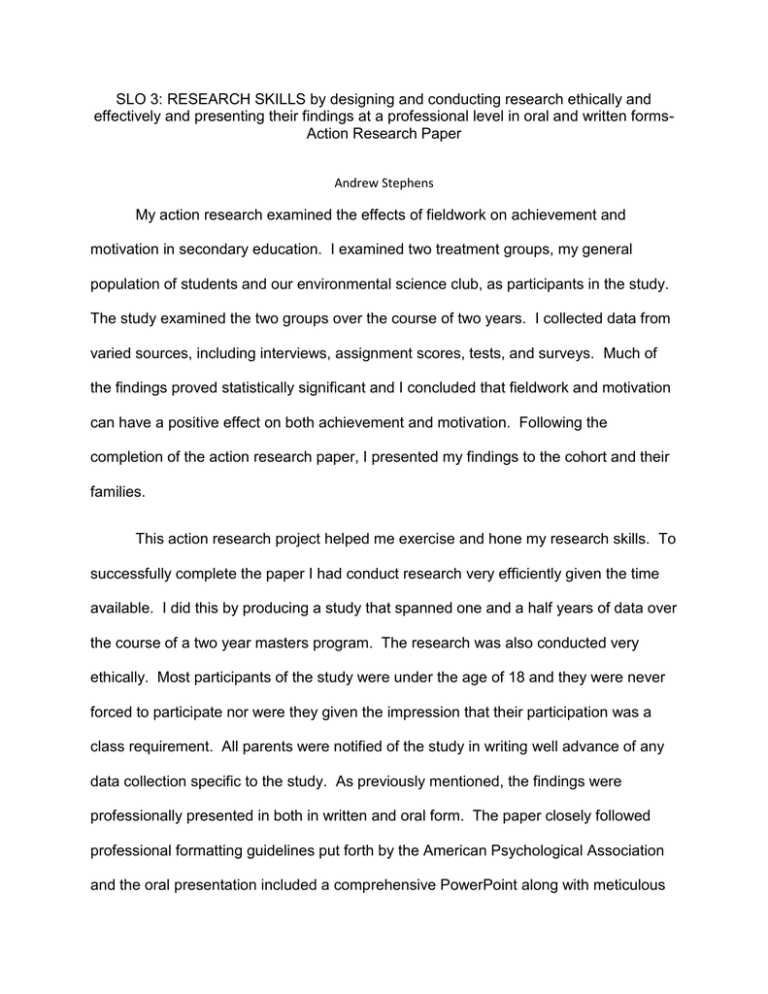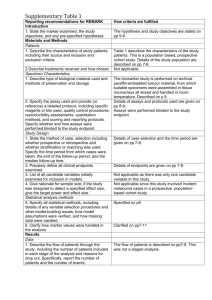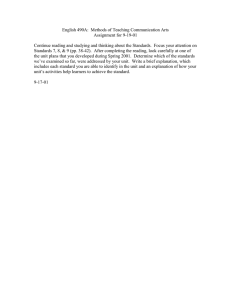SLO 3
advertisement

SLO 3: RESEARCH SKILLS by designing and conducting research ethically and effectively and presenting their findings at a professional level in oral and written formsAction Research Paper Andrew Stephens My action research examined the effects of fieldwork on achievement and motivation in secondary education. I examined two treatment groups, my general population of students and our environmental science club, as participants in the study. The study examined the two groups over the course of two years. I collected data from varied sources, including interviews, assignment scores, tests, and surveys. Much of the findings proved statistically significant and I concluded that fieldwork and motivation can have a positive effect on both achievement and motivation. Following the completion of the action research paper, I presented my findings to the cohort and their families. This action research project helped me exercise and hone my research skills. To successfully complete the paper I had conduct research very efficiently given the time available. I did this by producing a study that spanned one and a half years of data over the course of a two year masters program. The research was also conducted very ethically. Most participants of the study were under the age of 18 and they were never forced to participate nor were they given the impression that their participation was a class requirement. All parents were notified of the study in writing well advance of any data collection specific to the study. As previously mentioned, the findings were professionally presented in both in written and oral form. The paper closely followed professional formatting guidelines put forth by the American Psychological Association and the oral presentation included a comprehensive PowerPoint along with meticulous preparation. The final presentation of both the paper and verbal versions of the project was a result of revisions thanks to constructive feedback from professors and colleagues in the cohort. The process of planning, researching, data collecting, analyzing, concluding, and reflecting involved in this project were tremendous. Through the process I learned how to become a better researcher; I became a more efficient searcher for articles, a better synthesizer of information, a better executor of long term plans, a better a data collector, a better data analyzer, and a better concluder. Before engaging in this extremely rigorous process I thought that educational research involved simply summarizing some articles on the topic at hand. I had no idea that a true teacher researcher went to such lengths to further their own knowledge and become a better practitioner. The process of data collection, synthesis, and analysis put me low on the learning curve. I had only recently learned how to use excel and this process made find and use more features than I knew existed. I moved beyond the averages, modes, and means to learn that true statistical analysis involved the strenuous and considerable process of statistical significance. Serendipitously, I had sample sizes big enough and a study long enough that I found most findings statistically significant. This process has helped me understand and be more critical of so many of the findings that I have read before. Ultimately, I would have never understood research to level of understanding that I have now unless I had undergone the whole thing myself. The most valuable thing that came out of this paper, besides a confirmation of the axiom ‘don’t procrastinate’ were the furthered connections with my students. I never could have understood their progress, struggles, and academic histories had I not collected such extensive data. Ultimately the process helped me become a better teacher of my students.



